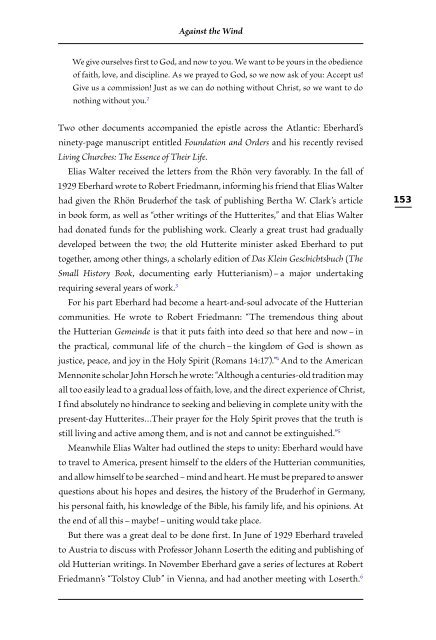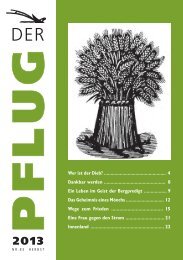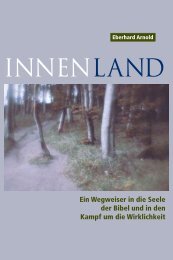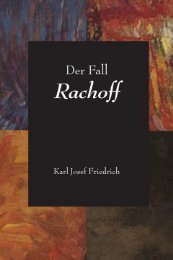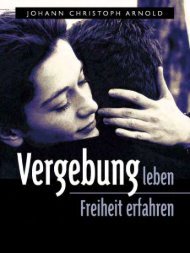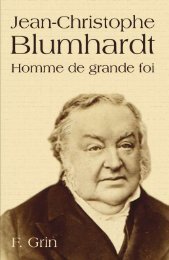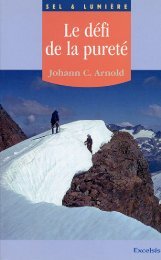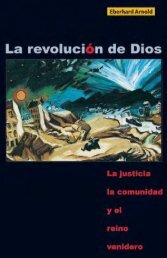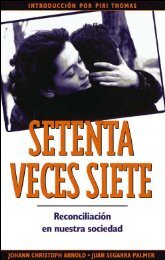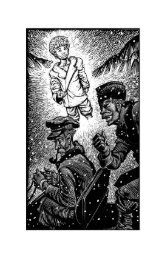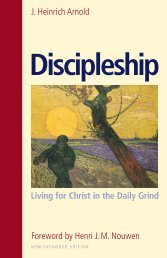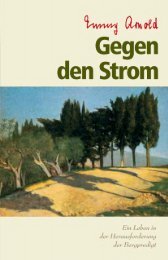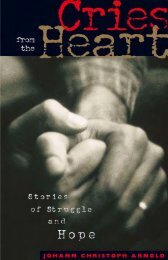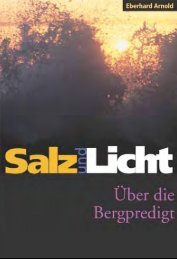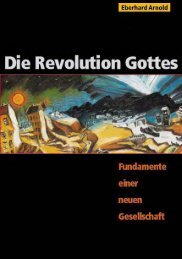Against the Wind: Eberhard Arnold and the Bruderhof - Plough
Against the Wind: Eberhard Arnold and the Bruderhof - Plough
Against the Wind: Eberhard Arnold and the Bruderhof - Plough
Create successful ePaper yourself
Turn your PDF publications into a flip-book with our unique Google optimized e-Paper software.
<strong>Against</strong> <strong>the</strong> <strong>Wind</strong><br />
We give ourselves first to God, <strong>and</strong> now to you. We want to be yours in <strong>the</strong> obedience<br />
of faith, love, <strong>and</strong> discipline. As we prayed to God, so we now ask of you: Accept us!<br />
Give us a commission! Just as we can do nothing without Christ, so we want to do<br />
nothing without you. 2<br />
Two o<strong>the</strong>r documents accompanied <strong>the</strong> epistle across <strong>the</strong> Atlantic: <strong>Eberhard</strong>’s<br />
ninety-page manuscript entitled Foundation <strong>and</strong> Orders <strong>and</strong> his recently revised<br />
Living Churches: The Essence of Their Life.<br />
Elias Walter received <strong>the</strong> letters from <strong>the</strong> Rhön very favorably. In <strong>the</strong> fall of<br />
1929 <strong>Eberhard</strong> wrote to Robert Friedmann, informing his friend that Elias Walter<br />
had given <strong>the</strong> Rhön <strong>Bruderhof</strong> <strong>the</strong> task of publishing Bertha W. Clark’s article 153<br />
in book form, as well as “o<strong>the</strong>r writings of <strong>the</strong> Hutterites,” <strong>and</strong> that Elias Walter<br />
had donated funds for <strong>the</strong> publishing work. Clearly a great trust had gradually<br />
developed between <strong>the</strong> two; <strong>the</strong> old Hutterite minister asked <strong>Eberhard</strong> to put<br />
toge<strong>the</strong>r, among o<strong>the</strong>r things, a scholarly edition of Das Klein Geschichtsbuch (The<br />
Small History Book, documenting early Hutterianism) – a major undertaking<br />
requiring several years of work. 3<br />
For his part <strong>Eberhard</strong> had become a heart-<strong>and</strong>-soul advocate of <strong>the</strong> Hutterian<br />
communities. He wrote to Robert Friedmann: “The tremendous thing about<br />
<strong>the</strong> Hutterian Gemeinde is that it puts faith into deed so that here <strong>and</strong> now – in<br />
<strong>the</strong> pracical, communal life of <strong>the</strong> church – <strong>the</strong> kingdom of God is shown as<br />
justice, peace, <strong>and</strong> joy in <strong>the</strong> Holy Spirit (Romans 14:17).” 4 And to <strong>the</strong> American<br />
Mennonite scholar John Horsch he wrote: “Although a centuries-old tradition may<br />
all too easily lead to a gradual loss of faith, love, <strong>and</strong> <strong>the</strong> direct experience of Christ,<br />
I find absolutely no hindrance to seeking <strong>and</strong> believing in complete unity with <strong>the</strong><br />
present-day Hutterites…Their prayer for <strong>the</strong> Holy Spirit proves that <strong>the</strong> truth is<br />
still living <strong>and</strong> acive among <strong>the</strong>m, <strong>and</strong> is not <strong>and</strong> cannot be extinguished.” 5<br />
Meanwhile Elias Walter had outlined <strong>the</strong> steps to unity: <strong>Eberhard</strong> would have<br />
to travel to America, present himself to <strong>the</strong> elders of <strong>the</strong> Hutterian communities,<br />
<strong>and</strong> allow himself to be searched – mind <strong>and</strong> heart. He must be prepared to answer<br />
questions about his hopes <strong>and</strong> desires, <strong>the</strong> history of <strong>the</strong> <strong>Bruderhof</strong> in Germany,<br />
his personal faith, his knowledge of <strong>the</strong> Bible, his family life, <strong>and</strong> his opinions. At<br />
<strong>the</strong> end of all this – maybe! – uniting would take place.<br />
But <strong>the</strong>re was a great deal to be done first. In June of 1929 <strong>Eberhard</strong> traveled<br />
to Austria to discuss with Professor Johann Loserth <strong>the</strong> editing <strong>and</strong> publishing of<br />
old Hutterian writings. In November <strong>Eberhard</strong> gave a series of lectures at Robert<br />
Friedmann’s “Tolstoy Club” in Vienna, <strong>and</strong> had ano<strong>the</strong>r meeting with Loserth. 6


